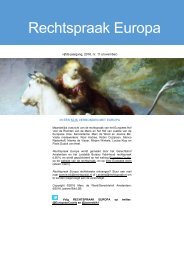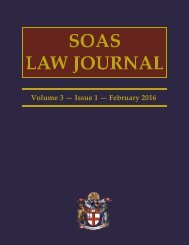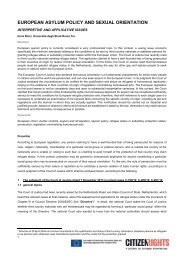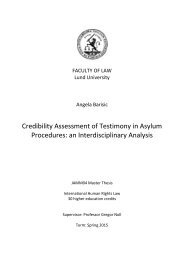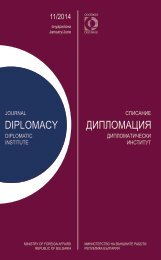AEMI
AEMI-2016-web
AEMI-2016-web
You also want an ePaper? Increase the reach of your titles
YUMPU automatically turns print PDFs into web optimized ePapers that Google loves.
32 <strong>AEMI</strong> JOURNAL 2015<br />
someone who willingly or unwillingly<br />
was led to reside away from his homeland.<br />
It also applies, in a more restricted<br />
sense, to people of a very high social profile<br />
that at some point had to reside in a<br />
country other than their own, as happened<br />
with previous rulers or members<br />
of Royal families, as well as prominent<br />
politicians, generally by government enforcement.<br />
As a relevant example, the Exiles<br />
Memory-Space (Espaço Memória dos<br />
Exílios)1, a museological oriented space<br />
located in Estoril (Portugal), documents<br />
the presence in Portugal of a large<br />
number of crowned heads of European<br />
ex-monarchies. There is Spain (Don<br />
Juan de Borbón y Battenberg, the son of<br />
King Don Alfonso XIII of Spain and his<br />
wife Queen Victoria Eugenie, Counts<br />
of Barcelona), France (Counts of Paris),<br />
England (Duke of Windsor Edward Albert<br />
and Wallis Simpson), Italy (King<br />
Umberto II and Queen Marie Joseph<br />
of Italy), Luxembourg (Grand Duchess<br />
Charlotte of Luxembourg), Austria<br />
(Otto and Joseph of Habsburg), Romania<br />
(Carol, son of Ferdinand, King<br />
of Romania), Bulgaria (Queen Giovanna,<br />
accompanied by her two sons,<br />
King Simenon II and Princess Marie<br />
Louise), Serbia (Princess Helena Karageorgevitch)<br />
and Hungary (Archduke<br />
Josef Árpád von Habsburg Lothringen).<br />
All linked by ties of kinship, shared the<br />
same space that served as a refuge from<br />
the war that had broken out in Europe<br />
and reached the countries from which<br />
they originated.<br />
Another example refers to the famous<br />
group of expatriates, who, willingly and<br />
as the result of their free choice, moved<br />
from one continent to another: the renowned<br />
American writers and intellectuals<br />
who chose Paris for residence,<br />
between the 1920s and 19440s: Ernest<br />
Hemingway, Samuel Beckett, John<br />
dos Passos, Lawrence Durrell, F. Scott<br />
Fitzgerald, James Joyce, Henry Miller,<br />
among many others.<br />
Portugal served not only as a space<br />
of shelter, it was, in the best of senses, a<br />
bridge of passage for thousands of people<br />
of various nationalities that were persecuted<br />
by German Nazis and later managed<br />
to reach the American continent.<br />
In the year of the invasion of France<br />
by Germany (1940) during World War<br />
II, Aristides de Sousa Mendes, Consul<br />
of Portugal in Bordeaux, defied direct<br />
orders of dictator António de Oliveira<br />
Salazar, who acted as Minister of Foreign<br />
Affairs. For five days thousands of<br />
entry visas for Portugal were granted to<br />
fleeing persons (including an estimate of<br />
ten thousand Jews).<br />
In a very different perspective from<br />
the previous one, any resident outside<br />
its area of origin, in his own country<br />
or abroad can then feel «exiled». The<br />
literary productions that refer to the<br />
nostalgic feelings of those who compare<br />
the memories of a land they consider<br />
their own with the reality of where they<br />
went on to live are widely known 2 . Let<br />
us recall the «Song from Exile (Canção<br />
do Exílio)» by the Brazilian author<br />
Gonçalves Dias 3 written in Coimbra in<br />
1843, taking this idea as a leitmotif:<br />
God forbid I die,<br />
Without me getting back there;<br />
Without enjoying the perfections<br />
I can’t find here;<br />
Without seeing the palm trees,<br />
Where the Sabia bird sings.



